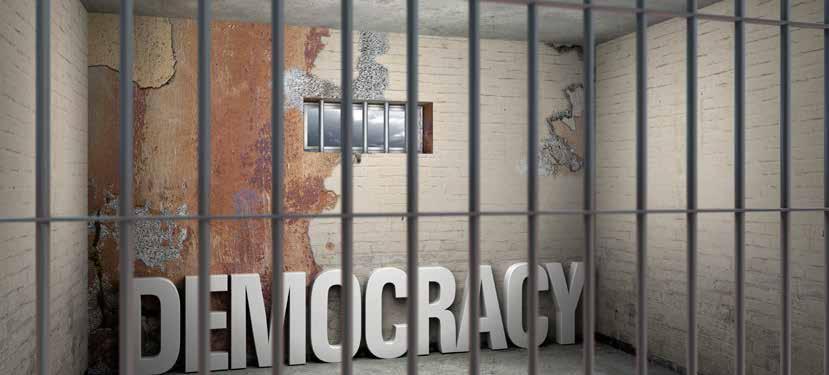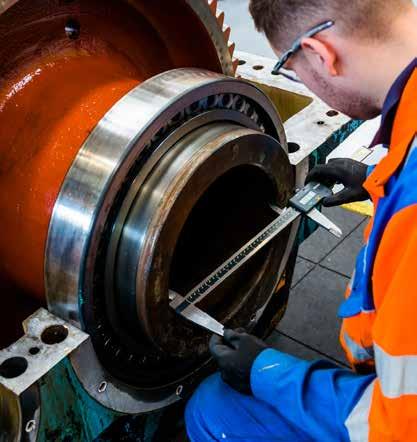
4 minute read
What has Donald Trump taught us?
Joe Biden, the 46th President of America, has taken the reins of power. The hope in many countries around the world is that this marks the end of the Trump era – that the mismanagement, lies and assaults on democracy, international institutions, US-allies and trade agreements will end.
The likelihood, however, is that many people are going to be disappointed. In their book, How Democracies Die, coauthors Steven Levitski and Daniel Ziblatt explain that autocrats such as Donald Trump subvert the democratic processes in a number of ways. They demonise political opponents and independent media outlets – through constant claims of ‘fake news’ and conspiracy claims, while issuing a barrage of ‘alternative facts’; they undermine established institutions such as the judiciary, security and ethics agencies by limiting their power, purging bodies that act independently and through the widespread use of patronage – often on a scale that would put medieval monarchs to shame; and they rewrite the rules to slant the playing field in their favour – for example, through gerrymandering or disenfranchising groups of electors. Donald Trump and his cronies managed to achieve all of this and more while in office.
Advertisement
In just four years they successfully managed to change political and social norms, leading to even greater polarisation and entrenchment of radical views that are becoming increasingly difficult to reconcile. Indeed, despite the obvious failings and instability of the Trump regime some 74 million people still voted for him, with the majority of Republican politicians either endorsing his increasingly frenzied calls to overturn the election result, or at best maintaining a conspiratorial silence in the face of all the evidence to the contrary. His legacy will be felt in other ways. On the world stage, the damage he inflicted on international trade, health and security bodies and agreements will take some time to repair – if it is repairable at all. Trump’s ‘America First’, his belligerent actions on tariffs and withdrawal from key agreements such as the Paris Climate Agreement and the Iran Nuclear Deal have changed the international perception of America as a world power. This has taken place against the backdrop of huge socio-economic global disruption caused by the Covid pandemic, an increasingly expansionist stance taken by China and Russia, and of course Brexit. The reality is that there will be no return to
normality – to business as usual. Too many things have changed at a local, national and international level. We have all become used to business conducted by Teams or Zoom, to limited travel and the absence of face-to-face exhibitions and events, while governments across the world have either become
increasingly isolationist or protectionist as they seek to maintain their power and influence.
Ultimately, although Donald Trump has had a destabilising influence on American politics and international relations, he is no more than a symbol of the social and political changes that have been going on for some time. In America, for example, there has long been a drift towards increasingly polarised views, aligned with systemic manipulation of the democratic process to promote the interests of one party or another at a cost to the wider majority. On the global stage, the rapid growth of China as a political, economic and military power has been accelerating since the country implemented free-market reforms in 1979, while the defence of the European project in the face of growing nationalism in countries ranging from the UK to Hungary and Poland has constrained the Brexit negotiations on both side of the table for the last four years. Perhaps what Trumpism has shown us is that societal norms of stability, tolerance and moderation can easily be shattered, and that extreme views and actions can quickly be deemed acceptable by large sections of the populace when they are prepared to believe the views of an autocratic leader. When this coincides with the other major events, natural, political or social, then we have a perfect storm that drives rapid change to the world in which we live.
One thing is for sure: we can’t avoid change. But we can develop better methods of recognising change, predicting its impact and responding with positive and imaginative measures that protect us, our families, business and societies.
Can your gearbox go the distance?

Heading 1
Body copy text .Harum fugit aut aspellit omnihil opta Optimize driveline performance ipsam, ipsanditis doles earum resed eati sae explitate lam, quidesti officia dolor sam, volupsimuste with SKF bearings and more. tatis expliti onsecatio. Itat exero to beat hitio vendi nulpa et veri omnim nihillaccus, offictibus SKF optimizes transmission performance and eatet lab idi tessint volore in reptinvellit quamus, reliability for manufacturers and end users alike. volorem et am verum unt. Using the SKF Life Cycle Management approach, Heading 2 we can help you Sam et doluptat rercienet, optatat urissunt • Increase torque volupta tasped quassi cone rere perferf ere • Downsize designs ceaquod minimet ut quid ut preribusdam ut • Double bearing service life • Improve energy efficiency • Increase reliability • Reduce energy use We help you reach these goals with a complete range of gearbox solutions – from upgraded SKF Explorer spherical roller bearings to commissioning, repair and remanufacturing services and much more. For more information, visit skf.com.

Gearbox services repair, replace or upgrade? It’s your choice…
When deciding whether to repair, replace or upgrade your gearbox, it’s important to determine what represents the best value.
At ERIKS we understand your requirements and offer the complete gearbox solution.
Application and project engineering
Design and customisation
Assembly and installation
Repair, replace or upgrade options
Safety and control integration
Asset management











